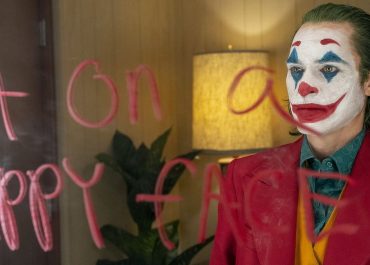It’s difficult not to notice that, oftentimes, Hildur Guðnadóttir’s sad, dismal cello-led composition sets the mood for Todd Phillips’ Joker. The mournful scoring accompanies us as Lawrence Sher’s camera sweeps the fictional Gotham city (that somehow resembles the 1970s New York from Martin Scorsese’s Taxi Driver) that has gone decayed with moral degradations and severe social gaps. Against the beautiful melancholy, we’ve witnessed the poetic descent of a social pariah named Arthur Fleck into a character infamously known as Joker, Batman’s archnemesis in any incarnations.
Phillips (Hangover trilogies) models Joker after Scorsese’s nuanced New York movies, specifically Taxi Driver and The King of Comedy. It’s a story of a sad man who aspires to make living by trying to be funny. Joaquin Phoenix is Arthur Fleck, a professional clown dreaming to be a stand-up comedian. Arthur is like an amalgamation of Robert De Niro’s Travis Bickle and Rupert Pupkin (Interestingly, they cast De Niro in the movie as a famous comedian and talk show host in a familiar twist). With such models, Phillips and co-writer, Scott Silver (8 Mile, The Fighter), reimagines a popular DC comic character with a suffocating character-study.

Everything about Arthur is bizarre but unsurprising. You will soon wonder why a single drop of tears dripping off his cheek when Arthur starts putting on a happy face only to see his clown make-up ruined. On some other occasion, he uncontrollably bursts into laughter when he feels sorry. He has a physical condition and mental issue that he keeps complaining about. He blames normal people for expecting people with a mental issue like him to act like he doesn’t have it. It’s a strong point that Arthur can make, but the movie does not intend to elaborate it, nor confirm the realness. In short, Joker questions the audiences whether we want to believe and sympathize with Arthur, or we simply take him for granted.
Similar to most of Gotham’s unfortunate dwellers, life has treated Arthur unfairly. The life makes a joke out of him, a harsh one, but without a punchline. In exchange, life makes Arthur a human punchbag instead.
Joker observes a series of Arthur’s failed attempts to connect. He’s mocked, beaten, and ignored. Phillips often toils audiences into thinking that Arthur’s deteriorating mind is sudden and explosive, while it is not. When his sufferings get unbearable, the camera does not look away—it stays where it was, forcing audiences into looking straight to it. While we expect that he’s going to erupt, Joker cleverly sends Arthur to cave back to his apartment where he lives with his mother (Frances Conroy). There, he’ll succumb to loneliness, misery, and anger—a sight that Phillips loves us to watch thoroughly.
Phoenix carries out his task to reimagine the character is startling. He lost weight for the role (right after his hunky You Were Never Really There persona) and his performance is simply precise. The actor owns the character, brings delicacy to the fragile persona, and injects certain levels of danger when needed. You’ll see his reflection on the mirrors quite often and reads the sadness of a clown unobstructedly. Phillips repeatedly devises the mirror shots to transfer audiences into Arthur’s eyes, pondering and wondering what has become of him. And yet, the most iconic frames you’ll find in Joker are shot in low-angle, giving the impression that you look up to Arthur. For most of the shots, Phoenix will also look up as if he’s seeking answers and reasons for what has happened to him. Given Todd Phillips’ portfolio, it’s quite surprising that he opts to accentuate the titular character’s interior states without dialogues. As for Phoenix, he’s made another iconic Joker that does not refer to any previous incarnation. This is Arthur Fleck and, even when the movie’s titled Joker, it’s a story of him through and through.
Here comes the crazy theory that soars up. Given Phoenix’s portrayal of the titular character, I can be sure that this is not the origin story of the supervillain we’ve known as the Joker. There are some hints suggesting that his character is inspired by Joker in The, phenomenal comic, Killing Joke; but, he is not that villain that Batman keeps fighting for. Arthur Fleck evokes riots all around the city of Gotham but he’s not an anarchist nor a gangster, he’s only a suffering person that eventually becomes a symbol of resistance. The other Joker must have been existed by the movie’s timeline as a common person that will later be inspired by Arthur Fleck.
Don’t get me wrong. That doesn’t justify what Arthur Fleck has done. Ever since he commits his first crime (in a Taxi Driver twist, when he accidentally draws the attention of some punks that attempt to harass a woman), he’s turned into a nihilistic criminal. How Joker handles violence and mental health might reflect how morally ambiguous this movie is. In the end, Todd Phillips’ Joker makes an unsettling, uncomfortable inferno that does not let us look away from Arthur Fleck’s sufferings that transforms him into a face of horror. It redefines not only the character but also how comic book characters can be treated in a movie adaptation.

[imdb style=”transparent”]tt7286456[/imdb]


Leave a Reply